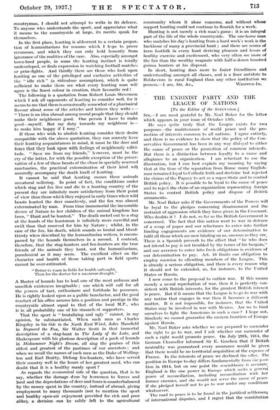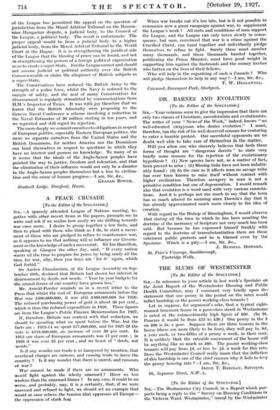THE UNIONIST PARTY AND THE LEAGUE OF NATIONS [To the
Editor of the SPECTATOR.]
am most grateful to Mr. Noel Baker for the letter which appears in your issue of October 15th.
He says quite truly that the League exists for two purposes—the maintenance of world peace and the pro- motion of interests common to all nations. I agree entirely, and there is no evidence to show that the policy of the Con- servative Government has been in any way disloyal to either the cause of peace or the promotion of common interests. But there is a distinction between loyalty to a cause and allegiance to an organization. I am reluctant to use the illustration, but I can best explain my meaning by saying that at the time of the separation from Rome many English- men remained loyal to Catholic faith and doctrine but rejected the claims of the Papacy to act as a super-State and to control British policy. It is possible to be loyal to the cause of peace and to reject the claim of an organization representing foreign States to control British policy and dispose of British armaments.
Mr. Noel Baker asks if the Governments of the Powers will be loyal to the pledges concerning disarmament and the restraint of aggression which they have given in the Covenant. Who doubts it ? I do not, so far as the British Government is concerned. The fact that this nation went to war in defence of a scrap of paper and our reluctance to enter into further binding engagements are evidence of our determination to fulfil all those which are now binding on us, onerous as they are, There is a Spanish proverb to the effect that " he who does not intend to pay is not troubled by the terms of his bargain," and our aversion to enter into fresh obligations is evidence of our determination to pay. Art. 16 limits our obligation to employ coercion to offending members of the League. This is already a serious obligation, and there is every reason why it should not be extended, as, for instance, to the United States or Russia.
I now come to the proposal to outlaw war. If this means merely a moral reprobation of war, then it is perfectly con- sistent with British interests, for the greatest British interest is peace. But if it means that the League is to go to war with any nation that engages in war then it becomes a different matter. It is not impossible, for instance, that the United States may be involved in war with Mexico. Are we to bind ourselves to fight the Americans in such a case ? I hope not. Similarly we cannot guarantee the eastern frontiers of Europe against Russia.
Mr. Noel Baker asks whether we are prepared to surrender the right to go to war, and I ask whether our surrender of such a right would promote peace. On July 29th, 1914, the German Chancellor informed Sir E; Gosehen that- if British neutrality was guaranteed every assurance would be given that there would be no territorial acquisition at the expense of France. In the interests of peace we declined the offer. The position in Europe to-day differs fundamentally from the posi- tion in 1914, but on one point the resemblance is accurate. England is the one power in Europe which seeks a general peace of reconciliation, including reconciliation with her former enemies, and she would not serve the cause of peace if she pledged herself not to go to war under any conditions
whatsoever. The road to peace is to be found in the juridical settlement of international disputes, and I regret that the constitution
of the League has permitted the appeal on the question of jurisdiction from the Mixed Arbitral Tribunal on the Rouma- nian-Hungarian dispute, a judicial body, to the Council of the League, a political body. The result is unfortunate. The proper appeal would be from a judicial body to a higher judicial body, from the Mixed Arbitral Tribunal to the World Court at the Hague. It is in strengthening the juridical side of the League that the blessing of peace can be found, and not in strengthening the powers of a foreign political organization so as to create a super-State. For the League cannot and should not assume judicial or political authority over the British Commonwealth or claim the allegiance of British subjects as a super-State.
The Conservatives have reduced the British Army to the strength of a police force, whilst the Navy is reduced to the margin of safety, and the zeal of many Conservatives for disarmament is regularly stimulated by communications from H.M.'s Inspector of Taxes. It was with joy therefore that we learnt that the British Admiralty were proposing to the Geneva Naval Conference a scheme involving a reduction in the Naval Estimates of 50 million sterling in ten years, and we regretted and still regret its rejection.
The more deeply we commit ourselves to obligations in respect of European politics, especially Eastern European politics, the more we separate ourselves from the United States and the British Dominions, for neither America nor the Dominions can bind themselves in respect to questions in which they have no interest and possess no knowledge. To many of us it seems that the ideals of the Anglo-Saxon peoples have pointed the way to justice, freedom and toleration, and that the elimination of their influence would not only be a disaster to the Anglo-Saxon peoples themselves but a loss to civiliza- tion and the cause of human progress.—I am, Sir, &c.,
GRAHAM BOWER.
Studwell Lodge, Droxford, Hants.



























































 Previous page
Previous page